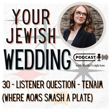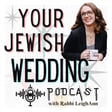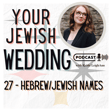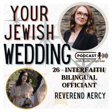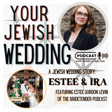Introduction to Jewish and Interfaith Weddings
00:00:00
Speaker
The only difference between Jewish Jesus and Christian Jesus is the Christ part. It's a big difference, but it is the only difference, pretty much. You know, Jesus was one of our guys. I've said it before.
00:00:11
Speaker
Are you planning a Jewish or interfaith wedding? Are you lost on where to even begin planning the ceremony, let alone finding a rabbi to help you? Well, it doesn't matter whether one of you is Jewish or you're both Jewish. You deserve a guide. So take a deep breath. I promise it will all be okay. Welcome to your Jewish wedding with Rabbi Leanne. Here, I can be everyone's rabbi.
00:00:39
Speaker
Yours too. My guests and I will share everything we know to help make your Jewish or interfaith wedding full of tradition and perfectly yours.
00:01:04
Speaker
Hey everyone, Rabbi Leanne from the future just here to note that this episode was originally the second half of an episode on interfaith ceremonies. I ended up talking for like an hour and 45 minutes, decided to split it into, you are welcome. So now that we know that, let's begin the show.
Customizing Wedding Ceremonies
00:01:34
Speaker
So welcome back. Let's talk about ideas for tying the two faiths and cultures together into one beautiful personal ceremony that perfectly suits the two of you. As I said at the beginning of the episode, the most important people to consider when you're doing this is the two of you.
00:01:57
Speaker
It is your wedding. It's about your relationship. That said, if it is very important for you to make your mom or your grandma happy, then that is something you can do also. That's kind of the same as it being important to you. Listen, no shame if you are doing something just to sort of get your mom or dad or grandma to stop complaining.
00:02:15
Speaker
That's okay. All right. No judgment from me, right? You guys know this is a place of no judgment. So honestly, I have to give you a little apology right now because I feel like all of you might have gone looking for a Jewish wedding podcast wherever you have found this podcast just for this topic because it's a tough one.
Integrating Jewish and Christian Elements
00:02:32
Speaker
You have decided to get married. Congratulations. It's very exciting. You've got to figure out a ceremony and you're like, okay, but how do we do this? Cause we know that the ceremonies are so different or we don't know much about either ceremony, but we just know that they are different. Okay. Here we are in episode nine. I started thinking it can be a dangerous thing to do as you know.
00:02:51
Speaker
We went through all this preamble, but we are here now and that's what matters, right? And listen, no hard feelings. If you tune in for episode nine, planning an interfaith ceremony, then you don't tune in for episodes one through eight. That's fine. It's all love, guys. No worries, no judgment, no stress, okay? So if you have a specific question about combining faith elements or cultural elements for your ceremony, email me.
00:03:19
Speaker
Your Jewish Wedding Podcast at gmail.com. Be as specific as you can. It's okay if it's not very specific, but as much as you can. And I will answer your question on the show. I hope I get a lot of these questions and so we can sort of brainstorm together through this medium.
00:03:35
Speaker
And maybe you can even come on to the show and we can talk about it together. We could talk through it together, but only all of this only to your comfort level. But please, I'm happy to help. I'm here to help. Okay. Let's put our heads together. So in the last episode, we talked about how 70% of Americans are Christian and another 22% of Americans are probably nothing, but probably have some Christian background in their families. Okay.
00:03:58
Speaker
It's a large percentage of people that Jewish people are going to be marrying people with some level of Christian identification. So these ceremonies are in some ways the most difficult, but in other ways the easiest to integrate the two faiths and traditions for the purposes of a Jewish ceremony that is a ceremony
00:04:19
Speaker
written and arranged and officiated by me or by a rabbi, okay? So think of all the things that we have in common. There's the big one. You guys know what I'm talking about. That's right, it's Jesus.
00:04:37
Speaker
The only difference between Jewish Jesus and Christian Jesus is the Christ part. Okay. It's a big difference, but it is the only difference pretty much, you know, Jesus was one of our guys. I've said it before. So we've got Jesus in common. What else do we have in common? Wine. And then of course, Jesus and wine, which this is a fun story that I'm still learning about the references to this and the historical information. However, those of you who know,
00:05:08
Speaker
your New Testament stories. Y'all read about Jesus at that wedding at Cana, and the bride either could not afford an open bar, or I don't know, the wine yield that year was terrible, or for whatever reason, they just ran out of wine, but they had a lot of water. Jesus was there, so hold that thought. We are going to talk about Jesus plus wine in a little second, okay?
00:05:36
Speaker
What else do we have in common? The majority of the Bible, quote, unquote, Old Testament. That's like Hebrew Bible. And then there's a little bit extra that makes up the Christian Bible. Okay, interestingly, I've taken some long looks at the Catholic nuptial blessing.
00:05:52
Speaker
So the Catholic Church is super old, almost as old as Judaism, not really almost as old as Judaism, but it's old enough that there are bodies of law about what a Catholic person is supposed to do, like in terms of living life, like laws about pretty much every aspect of life.
00:06:14
Speaker
However, the Catholic Church also spread throughout the world pretty early on and, as such, picked up different customs from different places, which means that there is not one singular version of pretty much any prayer or liturgical moment in the Catholic Church.
00:06:35
Speaker
All that is to say, there are a few different versions of the Catholic nuptial blessing that are acceptable according to the Catholic Church to count, quote unquote, count for marriage. All of the translations that I have seen are thematically actually very close to the seven wedding blessings, which is a central part of the Jewish wedding ceremony.
00:06:57
Speaker
So we can talk about the same themes, the miracle of creation, the genius of God creating humans, the importance of being in loving, respectful relationships with one another and with our community. All those things are part of the Catholic nuptial blessing in the same order as in the Jewish seven wedding blessings. I was super floored when I found that out, asked the couple that I'm working with now on their Jewish Catholic wedding,
00:07:25
Speaker
They may have been a little frightened by how excited in a geeky way I was over the similarity between these two prayers. You learn more every day, right? So speaking of Jesus and wine and the seven wedding blessings, get this.
00:07:44
Speaker
The seven wedding blessings, as I said, we will have a deep dive episode onto the seven wedding blessings, but they are the liturgical center of a Jewish wedding ceremony. The most incredible thing about these seven wedding blessings is that we know that they are very old because we see references to them in large part
00:08:07
Speaker
like almost exactly as we say them at weddings today in the year 2023, we have seen copies of that text in large part in the Mishnah, which is the earliest written body of Jewish law post-exile from the temple, written between 200 and 600 AD.
00:08:33
Speaker
And they are written in a way that indicates that they are commonly said, these words are commonly said at wedding ceremonies in general. It indicates a sort of liturgical importance to those seven wedding blessings, even at that time in that early year, which indicates that very likely these blessings were being said at weddings during the time of the life of Jesus, which means
00:09:03
Speaker
that the awesome wedding where Jesus was a really big mensch and really covered for that bride who had not arranged for enough wine for everybody, it is highly likely that at that very wedding, in that story, Jesus would have heard the seven wedding blessings in the Hebrew language.
00:09:25
Speaker
How insane is that? Insane in a good way, in a cool way, right? Think about it. We know Jesus was a Jew and we sort of give that lip service all the time, but we kind of, I think, forget that Jesus' life was, for most of his life, a pretty Jew-y life. He was just a Jew doing Jewish things with other Jews, including going to their weddings and hearing the stuff in wedding blessings.
00:09:50
Speaker
So sometimes when a couple is planning their wedding and one of them is Christian and has a strong identification with that, either religiously, spiritually, or culturally, and I bring this up suddenly to that person, the seven wedding blessings, which is, again, a Jewish wedding thing, a squarely Jewish wedding thing.
Combining Diverse Religious Vows
00:10:13
Speaker
feels like it actually represents part of that Christian person's culture as well. I'm not making any arguments about whether the Seven Wedding Blessings are actually a Christian thing because I don't think they are, but that's not the point. The point is whether it resonates with somebody
00:10:28
Speaker
who has a strong identification with the figure of Jesus, with the stories, with the culture, with the faith. Of course, moving on from Jesus and his awesome party skills, we have rings. Obviously, both Jewish and Christian ceremonies tend to have a ring exchange, so that is something that
00:10:50
Speaker
we can use as sort of a merge point, I guess, for both cultures, traditions, faiths. Usually that looks like a double set of vows. Okay, so you have more traditionally Christian vows, you'll have more traditionally Jewish vows, or you do Jewish vows with a more traditional Christian translation. Usually, from what I've seen, those do not include mentions of Christ and the church.
00:11:20
Speaker
but it's not something that I would rule out as long as I didn't have to say those words, right? Because I'm a rabbi, I don't believe in the religious tenets of the Christian faith. And so I can't lead those parts of the ceremony, but I am okay with couples seeing those things, okay? Even in traditional Catholic ceremonies, there is a moment where there's a shawl raised above the couple's heads while they
00:11:47
Speaker
engage in prayer. Effectively, what this looks like is actually like a hubba, like the wedding canopy that Jewish people get married under. However, in most weddings that I do, couples choose to have a prayer shawl wrapped around both of them while their parents offer them a blessing, or while I offer them a blessing. And so that shawl moment is common to both of those tradition ceremonies. Very cool, okay?
00:12:13
Speaker
So you might be saying like, man, Rabbi Leanne, you're talking a lot about Catholics. Why? Because I listen, I've got a lot of Catholic people who are marrying Jewish people. Catholics and Jews tend to get along like really well in relationships for several reasons. If you guys want an episode about that, I have some thoughts and feelings and I will talk about that. I think it's pretty cool. But of course, there are plenty of regular old Christians or like Episcopalians or Lutherans or Methodists or Presbyterians or Baptists.
00:12:43
Speaker
who also marry Jewish people. And in a lot of those denominations, their vows, guess what? It's a little easier to merge into a Jewish wedding ceremony because those vows and other faiths don't typically include Christ and the church, and especially don't really talk about how you're gonna raise your children. I think that the Book of Common Prayer, which is like an Anglican church prayer book, might have one version of the vows that mentions
00:13:11
Speaker
Jesus or Christ and the church, but also ones that don't. And so from my viewpoint, in my experience, those kinds of vows that don't include those particular words tend to be a lot easier for the Jewish person in the couple to quote unquote stomach to deal with, you know, it doesn't feel as gut punchy or like threatening as things mentioning, you know,
00:13:34
Speaker
explicit references to Christian faith. Also, of course, for both Catholics and the rest of Christians, we do have the Bible in common. As I said, there are so many beautiful readings from the Bible that are from the Hebrew Bible that Christians love to have in their weddings. Think of Psalms, think of Song of Songs, think of regular old stories from Genesis about people getting married. One of the requirements for a scripture reading for a Catholic wedding is that
00:14:02
Speaker
One of the readings has to explicitly mention marriage. Great. The Hebrew Bible has a lot of those. Do not worry. We can find it. Okay. They're now going outside of the ceremony a little bit. Something that a lot of people do to sort of make their parents happy or to make their parents feel like they had a faith filled wedding is to include a moment of saying grace before dinner. Cool. Jews do that too. It's called Hamotzi. If you're listening to this podcast and you're Jewish, you know, you're probably singing the tune in your head.
00:14:31
Speaker
It's a little prayer before we eat bread that we say at pretty much every celebration. You can say hamotzi and then have the non-Jewish couple members, parents say a grace before meals. We're so thankful for this day, whatever it is.
00:14:46
Speaker
Even something little like that, if you have, one of you has a parent who is really feeling like the ceremony is not representative of enough of you in like a Christian way, that can be a great way to help that parent feel like there is some more gravity in that sense without actually even including it in your ceremony. So, you know, win-win. If including it in your ceremony is something you're not comfortable with, you know.
00:15:12
Speaker
So because such a large proportion of Americans do have like a Christian cultural background or Christian history or faith, a lot of American customs that have built up around weddings, people view them as Christian. So I'm talking about things like a sand ceremony, which is a lovely image and or a wine ceremony. There's like, I've seen something about sharing a bottle of wine.
00:15:40
Speaker
That's built into Jewish weddings anyway. You can even, if you're going to do something like a sand ceremony, you can even acquire sand from different places that are important to you spiritually or religiously. So get some sand from Jerusalem. And that actually would be important for both faiths. And that would even work actually for a Muslim and Jewish wedding.
00:16:03
Speaker
because that's a holy site for all faiths. And then listen, think about it. You could get some sand from Jerusalem and some sand from where you were born and some sand from when, where your fiance was born. Done. How beautiful. I think that sounds great. I've never done a sand ceremony in one of the ceremonies I've led, but if you want me to work on your wedding, please, like if you want to do that, like let's go.
00:16:25
Speaker
Let's figure it out. Cause I would, everything, every wedding brings me a different first. And I would love that. There's also the unity candle. The unity candle is something I've seen in like a lot of churchy ceremonies. I think listen to what's cool about this because there is a saying from the Baal Shem Tov who was a Hasidic master. One of the guys in like the 17 when was the Baal Shem Tov? Oh, I'm terrible.
00:16:57
Speaker
Oh, look at me. Look, I was right there in the middle. Okay. Born. Oh no, actually I was wrong. Okay. Born 1698. He was a Hasidic master born in the Ukraine and who served in the Ukraine actually really old for that time period. He died when he was 62. Cool. Um, he has a saying about when a couple is matched, it's like the light from each of their souls combines into one light and that
00:17:27
Speaker
rises up to heaven in joyousness for their union. I'll put the exact quote in the show notes or I'll try my best, but it's very cool. So doing a traditional like unity candle ceremony within a church or a Christian setting could be accompanied by that very, you know, traditional Jewish reading. Cool, cool, cool. Okay.
00:17:45
Speaker
Now, now we have Christians, but those are not the only other monotheists besides Jews. We also have Muslims. Muslims and Jews historically got along really well. I often tell people that in terms of practice and mindset, Jews are more similar to Muslims than to Christians in many, many ways.
00:18:05
Speaker
My understanding of Muslim weddings, and again, I have my eye on an Imam from London who does a lot of interfaith ceremonies that I'm really looking forward to speaking to, and I'm also going to have a rabbi who just officiated a Muslim-Jewish interfaith wedding. However, my understanding at this time is that a Muslim wedding is at its core like the exchange of something of value and the signing of a document, which guests
00:18:33
Speaker
what other tradition has those elements at the core of its traditional wedding ceremony.
00:18:39
Speaker
Yes, Jews. So I think that it's something that is super possible to integrate those two in terms of a really smooth wedding ceremony. Like you sign the katuba and you sign whatever you need to sign for the Muslim ceremony. You exchange rings. Perhaps there are things that are, I think there are things that are said in a Muslim ceremony that accompany those rings. Great. We have vows too. I think it would be pretty easy to sort of make those mesh or coexist really beautifully side by side.
00:19:10
Speaker
Let's take a short break and we will come back and talk about non-monotheistic cultures, faiths, and traditions. Okay, welcome back.
Incorporating Non-Monotheistic Traditions
00:19:33
Speaker
I think that, especially when we're talking about a non-monotheistic religion or culture or faith, so one that involves many deities, many different types of focus of religious devotion, I think actually that knee-jerk or gut-punch reaction that we talked about in terms of Jewish people having sort of like a trauma response to elements of those
00:20:02
Speaker
faiths, cultures, and practices, it's not as strong. I think it's not the same reaction, like gut reaction, that Jews have, because most of the modern and contemporary persecution of Jews was at the hands of Christians. So that's going to be a big player.
00:20:19
Speaker
However, Judaism is at its core a monotheistic religion, right? Like there's one thing that Jewish people pretty much universally agree that is a tenant of the Jewish faith and that is
00:20:33
Speaker
we've got one God, there's only one God, and all the other ones are fake, right? So when you're looking at a faith culture or practice that includes multiple gods or devotional focuses, I think that there's that sort of more cerebral or intellectual response of like, okay, but what your rituals and faith represents is literally the opposite of what my faith represents, right?
00:21:01
Speaker
And so I would encourage in the case that you are having an interfaith ceremony that you want to equally represent Jewish customs, prayers, and readings, and those of a non-monotheistic faith. Here's my biggest recommendation. Encourage your efficient,
00:21:21
Speaker
when you are incorporating any of those traditions, readings, remarks, draw them back to the sense of the unity of all things. Okay, so in other words, I think that usually with non-monotheistic religions, there is still a sense of many parts making up a whole. The whole being the world in which we live, the body of humanity,
00:21:45
Speaker
all kinds of things like that. And so even if it's not the same belief or even if it's a fundamentally diametrically opposed belief, there is sort of the same sentiment, which is that there is some greater power at play in our lives. And the way you can speak about God and gods in the same ceremony is by drawing them back to that concept, I think. So you can also use euphemisms for God to connect the two.
00:22:14
Speaker
So creator of all life. For the Jewish people in attendance at your ceremony, it will be obvious that that means God. It might mean a specific God or force to the other member of the couple. And I think if that's okay with the two of you, like that's okay. Other euphemisms for God. Bringer of truth. Merciful one. Provider.
00:22:41
Speaker
All kinds of euphemisms for God. Energy that makes for salvation. That's a little Jesus. There's referring to God. Some Jews actually have a tradition of referring to God in the feminine. Blessed one. Eternal presence. Still small voice.
00:23:01
Speaker
the idea of our conscience, a bringer of song, all kinds of things that we understand, Jews understand as different aspects of God may be represented by other cultures as actual different gods. And I think that by using that word or that phrase or that moniker, that is something that it should be reasonably easy to blend inside of one.
00:23:28
Speaker
wedding ceremony, okay? Now, we talked about this in the But Rabbi, We're Not Religious episode. If God language is in any way going to trigger people, that's fine. So there are several circles of Jewish meaning, right? Within a Jewish wedding ceremony, like I said, do we talk about the miracle of creation and thanking God for all that we have? Yes. But instead of focusing on the God part, let's focus on the part that is the gratitude.
00:23:58
Speaker
Right. So within a Jewish ceremony, let's say that you decide that you want the seven wedding blessings, for example.
00:24:06
Speaker
You want them in Hebrew for sure, but when it comes time to the translation of that Hebrew, you read the translations online and you're like, oh, this is God, king of the universe, whatever, master of all. I just, we really can't get into that. We're not religious people. We don't want to talk about God. That is fine. We can come up with translations of any of those prayers that acknowledges
00:24:29
Speaker
a greater presence of blessing and gratitude that does not mention God at all. I've done it before. I did it just recently. The latest wedding I officiated, that is something we definitely did for the seven wedding blessings for several reasons. So it is 100% doable. Let's work together and make it happen, okay?
Universal Wedding Themes
00:24:52
Speaker
So a lot of cultures, whether they are monotheistic or non-monotheistic, actually have really common customs, like customs in common surrounding weddings. Okay, so there are a lot of common themes. What is a wedding? It is bringing two people together, joining two people, sometimes joining two households, and
00:25:09
Speaker
making it into a big deal, basically, religiously or culturally, like displaying why it's important, right? So common themes and common rituals and representations of those themes crop up across different cultures in kind of an incredible way. So there are themes of honoring our families, right? We do things
00:25:30
Speaker
that showcase our parents, show gratitude to our parents, or invite our parents into the ceremony. They're guiding us into the next phase or they're welcoming us into one another's families. That's a really common theme we see across cultures. A lot of weddings across cultures
00:25:46
Speaker
include circles, walking in circles, drawing circles, tying circles. Almost every wedding ceremony includes the exchange of a symbolic object and in many cultures that is an object of value to show serious intent. So usually it's rings, but sometimes it's other stuff. We can make it work. Almost every culture includes some nature of exchanging a symbolic and or valuable object between members of the couple.
00:26:15
Speaker
The big one, of course, is making public promises. In almost every wedding ceremony you see, it will involve two people declaring something that discusses their
00:26:28
Speaker
long-term or lifelong commitment to one another and the promises they make to conduct themselves within that public declaration. So I will care for you. I will be faithful to you. I will respect you. I will always walk the dog when it's raining. I know you hate the dishes, so I'll handle that, whatever it is.
00:26:48
Speaker
All those things sort of culminate in the representation of the two of you being responsible and intentional in walking into your new life together. So considering these common themes of honoring our families, reflecting on our community.
00:27:08
Speaker
the symbolism of circles, the symbolism of exchanging symbolic objects or objects of value, the central importance of making public promises to one another, and even the simple choreography that happens both at the beginning of a typical ceremony, walking in separately, and then at the end walking out together,
00:27:31
Speaker
That's in almost every cultural or religious wedding ceremony. Given those things, it is a lot easier than you guys might think to make this interfaith intercultural ceremony happen. Don't worry. So what are some examples?
00:27:47
Speaker
that we might know a little bit less about. So in a Chinese wedding ceremony, that typically features a tea ceremony before the wedding, and that is where the two of you serve your parents' tea together, and that shows gratitude to your parents. It invites your parents' blessings, and then your parents would confer blessings on you.
00:28:07
Speaker
In a Jewish ceremony, there is also a period of time where the bride can offer blessings before the chuppah and her mother is there with her and can also offer those blessings. I believe sometimes her future mother-in-law also. In a Chinese ceremony, for example, if one of you is Chinese and one of you is Jewish, I guess a lucky color for Chinese weddings is red.
00:28:28
Speaker
Jewish ceremonies can use whatever colors you all want. It does not matter if it's inauspicious, whatever, if it represents something that's not monotheistic. Judaism uses tons of symbols that have nothing to do with God, or only retroactively have something to do with God, for example.
00:28:48
Speaker
That's right, the smashing of the glass. Some people think that the original purpose of that was to scare away evil spirits at the end of your wedding because that's when you two were happiest. So there are tons of things that probably do not have a religious origin that Jewish ceremonies use, which means if something comes from a non-religious origin from another faith or culture, it's great. Incorporate that. And then guess what? That's a new Jewish tradition as well.
00:29:13
Speaker
So I'm going to make a special effort as we go through deep dives into each of the elements of a Jewish wedding ceremony, where there might be some crossover also into interfaith ceremonies or to other cultures.
Cultural Parallels in Weddings
00:29:27
Speaker
Okay, I'm going to do my very best because I think that that could be a very good resource for a lot of couples.
00:29:47
Speaker
Guys, let's talk about Indian weddings. I have been so excited to learn about Indian weddings. I have to tell you, I had a small epiphany about this when I was watching Mismatched, which is on Netflix India. I was watching it because my friend Anjali told me to watch it like years ago and I've been sort of ignoring it for a while. And then I had like half a day free a couple of weekends ago.
00:30:16
Speaker
And I said, okay, I'm going to pack up my Rosh Hashanah packages and I'm going to watch TV. I sat down and I watched this show mismatched. It is, Anjali told me to watch it because it is an adaptation of a young adult novel that I loved like 10 years ago. And I actually recommend it to her. So now she's recommending this story back to me. It's kind of cool. Anyway, in season two, no spoilers. There is a wedding featured. It is not between the two main characters. If you're into the show, don't worry. It's not a spoiler.
00:30:42
Speaker
And I was looking at it and I'm like, okay, all y'all are underneath this canopy with four poles. Y'all are walking in circles. I think there's seven circles. Like, what is happening? So I just want to say, I do understand that India is a big country with lots of faiths for what it's worth in the show, mismatched. I believe it was a Hindu wedding.
00:31:05
Speaker
But in India, there are, of course, Hindus, Jains, Sikhs, Buddhists, Baha'is, yes, even Muslims, Christians, and even Jews that incorporate culturally Indian elements into their ceremonies, okay? So when I've looked into Indian weddings, I just want to be clear, I understand that Indian is not a religion. However, Indian weddings tend to share a lot of customs across different religions.
00:31:35
Speaker
which makes me think that these practices, just like a lot of the practices in the Jewish ceremony, are not religious, but in fact cultural. So there's usually a fire in the middle of the ceremony.
00:31:50
Speaker
you will see the bride and groom circle around it. And there are different customs. Sometimes it's four times, sometimes within that four times, the groom leads the bride around the circle. But the last one, the bride leads or the bride does herself.
00:32:11
Speaker
And then sometimes there's seven circles that they both take or they maybe take turns. Some of you know, we have not done an episode on this yet, but we will. There is a tradition of circling at the beginning of a Jewish ceremony as well. Now, traditionally, it would have been the bride, however, as
00:32:28
Speaker
Jews have become more egalitarian-focused or more inclusive. There have been all kinds of configurations of those seven circles, including walking them together, including doing a little switcheroo do-si-do situation, and it looks a lot like an Indian wedding, okay? Now, there's a platform in an Indian wedding that almost always the married couple are sitting on, the couple getting married.
00:32:54
Speaker
It is called a mandap. It always has four poles and a canopy. I'm sorry, but that's a hupa. So I found a lot of Indian or like faith-specific interpretations of the mandap, but it's present in like every Indian cultural wedding that I've seen, regardless of religion.
00:33:18
Speaker
And a chuppah, which is pretty much the same thing, except the chuppah is like you stand under it, the mandap is like you sit underneath it. I don't see that as such a huge difference, guys. There are also a ton of different explanations for the chuppah. So if you are having an Indian-Jewish wedding, congratulations. That is like the easy-peasiest way to symbolize to both your Jewish and
00:33:41
Speaker
Indian family members like, yeah, we're all in on this traditional ceremony thing. Apparently in an Indian wedding, there's also the situation where they tie garments together, which like I said, we also have a tradition in most Jewish ceremonies that I officiate where they're wrapped in a prayer shawl together. At the beginning of an Indian wedding, one of the most
00:34:03
Speaker
Common, I think, pop culture symbols of those weddings you'll see is a barat. I hope I pronounced that correctly, but it's something the groom does. He like rolls up to the ceremony in the most grand fashion. It's either like on a horse, like a white horse, or sometimes I've seen the groom coming in on an elephant. I've seen him coming in on fancy white cars. He's got a parade of all his people like singing and dancing him
00:34:32
Speaker
to the bride at the beginning of their wedding day. Guys, guess what? Jews have that too. Okay. We commonly refer to it as a tish, but typically it was tradition that the groom tries to give some sort of reflection on the day or religious teaching or devarto or something like that. And the custom is that all his friends and family members sort of like heckle him so that he can't actually get through them.
00:34:57
Speaker
the speech and then eventually he sort of gives up and there are all kinds of reasons for that. We'll have another episode of that, but it ends with, guess what? All of his people getting up, dancing, singing, and escorting him to where his bride is waiting for him. I am just, I've never officiated an Indian Jewish wedding, but if you could see the smile on my face right now,
00:35:20
Speaker
at the idea of how many commonalities there are between these two traditions. I am just freaking out, like so excited. Okay. So for genes, which is when it's a very minority religion in India, as far as I understand, there is also the signing of a document before the wedding, which is, I think it's a letter of intent. So traditionally, especially Eastern European Jews had something called a Tanaim, which was a formal ceremony surrounding a letter of engagement between the couple.
00:35:51
Speaker
So Jews still do that, but now it's less of a formal engagement and more of just like an engagement party. It's still called to Tanayim. Tanayim means the conditions under which we're getting married. Okay. I did see one of these letters of intent being signed in the Jain ceremony. Beautiful. However, the one letter that I saw was decorated with Indian swastikas, which I don't know if you guys know this. This is something that I've only recently learned
00:36:16
Speaker
But, okay, let's make a cultural reference. You know how Elon Musk is super basic, and he wanted a new logo for Twitter, and so he just sort of lifted the Unicode X and made it the new Twitter logo? All right, well, when Hitler wanted a Nazi logo, as far as I understand, he literally just stole the Indian swastika and tilted it 45 degrees and put a red circle around it.
00:36:43
Speaker
I don't know, whatever. I know that the Indian swastika is not a hate symbol. You know that very well. And I also know that Jewish people have a very strong gut reaction to seeing that symbol in any iteration, 45 degree twist or not red circle or not. I'm sorry. I would not recommend if you are doing one of these letters in intent, I don't know how important the Indian swastika is on these documents, but I would recommend just trying to leave that out. Okay.
00:37:11
Speaker
So another iconic Indian wedding custom is the henna. So I've seen these henna artists on Instagram. They are like celebrity henna artists for these Indian ceremonies. They have like signature styles they'll do. Everybody knows what henna is, right?
00:37:30
Speaker
henna is this paste that when you put it on skin it stains your skin and depending on like i guess the oils or the genetic makeup of your skin it can turn like dark brown or deep red and they just pipe it into different designs on the skin and let it dry and then it stains the skin and it's beautiful
00:37:51
Speaker
And these henna artists are so skilled and make the most beautiful designs. And I've seen some of them where she, the henna artist will do a bride's, typically it's her hands and her feet and then her arms that the henna is, that's the canvas for the henna. And she will hide the name of the groom in the bride's henna design and that it's like this whole thing to like hunt for it and find it and they post it on.
00:38:18
Speaker
Instagram and everybody's so like thrilled with it. Very cool. So I thought, I always thought that was like a specifically Indian ceremony thing. And then one of my brides from, oh, I guess two whole years ago now before the wedding posted pictures of her henna ceremony. And I'm like, what is this? You guys are both Jewish. You're like nothing but Jewish. Neither of you is Indian. What's happening? Guys, that's what I learned that a henna ceremony
00:38:46
Speaker
is also a custom in Sephardic Jewish families. And the Grooms family was Sephardic. Sephardic is Jews who come from like northern Africa, like sort of Morocco, Spain region of the world. And so, like I've said a million times, they absorbed the customs of that area.
00:39:07
Speaker
And so in Sephardic Jewish families, this is a super common thing to have a henna ceremony for the bride and groom. And it's a big party that it's sort of like a wedding shower, I guess, but there's the music and the food and the henna, the henna, the henna, and it's so cool. I kept seeing these pictures of the bride and groom sitting together and they had like a lump of henna, like strapped to their palm as part of the Jewish custom. And I'm not sure what that means if you know
00:39:34
Speaker
Or if you are my bride who had a henna ceremony or her mother-in-law and you want to come because I know you planned the ceremony, her mother-in-law, come on the podcast and enlighten us about it. I would love to hear about it. Okay.
00:39:48
Speaker
So in any of these ceremonies, like I said with Christian weddings, whether it's Muslim or any of the non-monotheistic religions, it's fine with me if holy texts are read.
Addressing Anti-Jewish Sentiments
00:39:59
Speaker
And if it is explicitly anti-Jewish, honestly, I don't love it. Okay, so if it says that like your religion is better than all the other religions or, you know,
00:40:10
Speaker
aren't Jews terrible or some allusion to that, I don't love it and I would really strongly recommend against it. If you guys needed to do a wedding reading that was explicitly like, are religions better than all the other religions and therefore also the Jewish religion,
00:40:25
Speaker
I would step away from the center of the ceremony at that time. But that doesn't mean that I couldn't trade that role with someone from your family or another clergy member. So for someone else to read it is perfectly fine. And I would just step out of the frame of the video for that point so that it didn't look like I was saying it. Do you understand? But it's fine with me if those things are present and especially if the reading or the scripture is
00:40:54
Speaker
something that goes back to what I mentioned about really coming back and tying back to the unity of all things or the existence of a higher power. Absolutely beautiful. So let's take one more little break and then we will come back to talk about what happens if one of us is Jewish and really wants a Jewish ceremony and the other one of us is just sort of like nothing.
00:41:26
Speaker
Okay, welcome back everyone. So what if one of you is Jewish and the other one of you has like no faith tradition or no cultural tradition that you can really pinpoint and you're feeling sort of like, I mean, it's great that we're having a Jewish wedding and I really like Jewish stuff, but I also sort of feel a little bit lost in this whole equation, right? So even if you yourself are nothing, let's say your family comes from a faith background or
00:41:52
Speaker
There's some wedding tradition in your family that's important to them, but it's not important to you. I'm gonna encourage you to try to throw a bone to your family. Especially if this wedding is especially significant in some way. You are the first child getting married or you're the last child getting married.
00:42:08
Speaker
or you're the first kid that's married outside of the faith and your parents need to feel reassured or something. Okay, so a reading from someone sort of religious who is important to your faith or culture or even somebody who is super representative of your faith or culture. So like let's say your family is Irish Catholic.
00:42:30
Speaker
and you are having, I'm officiating your wedding and we're gonna have the chuppah and all the Jewish stuff and your Irish Catholic background does not have really any bearing on your life. It doesn't mean a lot to you, but guess what? Your grandma's there and she is so excited for your wedding because she remembers her wedding and all this stuff. Can you include an Irish blessing, like a classic Irish blessing in your wedding if it's not religious? I bet you can.
00:42:58
Speaker
Or if your family has a faith tradition that includes someone who we know was of that faith tradition, but was not writing explicitly religious stuff. So for example, like for a Christian family, maybe a reading from C.S. Lewis.
00:43:15
Speaker
on the nature of God or the nature of love. I know he has a lot of that stuff. Or maybe a reading from Rumi or from Gandhi or some kind of Chinese poetry or
00:43:29
Speaker
prayer for married couples or something like that. If you have a Christian family, but they're like nominally Christian. So, you know, church attendance kind of waned over the years until it got to you, which was like never, but you have a lot of family members there. That's important to you. Is there something we can add to the ceremony from the Bible? So something maybe from Psalms or proverbs, just some life wisdom or some beautiful poetry, maybe from song of songs that actually I could read in Hebrew and make a super,
00:43:58
Speaker
non-religious translation of. That's one of the reasons you hire a rabbi because she knows her biblical Hebrew and she can make all kinds of creative translations that would make your parents, your grandparent, or your sister, or your uncle or cousins feel like they are welcome in that space and represented in that ceremony. Let's figure out how to do that.
00:44:18
Speaker
Even like I said, you can do some readings from the New Testament. There's some good stuff in the New Testament, guys. There's some inspirational letters towards early Christian communities. There are some cool sayings of Jesus, as long as they are not like anti-Jewish, like I said, like let's go.
00:44:35
Speaker
So even if you're not strongly connected with your ethnicity, remember in the last episode that I said that sometimes this Jewish wedding is the little nudge that Jewish people need to learn more about their Jewish heritage or Jewish customs. Guess what? This goes both ways. So if your family is Hindu in their tradition, even if you didn't grow up celebrating that way or observing that way,
00:45:03
Speaker
It's worth a dive into Hindu wedding customs, things that represent your faith, because there are things you can pull from that that might end up actually feeling really real to you. You know, I talked about this feeling that Jews have, that they are Jewish, part of the Jewish people, part of a long chain of tradition, a lot of times
00:45:22
Speaker
Jewish people will find they have an emotional connection to stuff they've never heard of before. I'm fairly certain that goes for other religions and traditions, okay? So take this opportunity. Even if, like, if you know your family has a Muslim background or your other family members in the past incorporated a lot of Chinese traditions or Japanese traditions into your wedding, see if you can learn about those things and if you might want to include those things in your ceremony.
00:45:48
Speaker
even though you don't have to or you didn't know about them before, that does not bar you from including them now, okay? And like I said, there are so many commonalities between different cultures' ceremonies. I can't imagine that there's no way to connect that to a Jewish ceremony, okay?
Personalizing with Cultural Symbols
00:46:04
Speaker
There are also contemporary American rituals. This goes back to what I said about the wedding industry being an industry. Everything's custom. Everybody's thinking about things that represent their relationship or their connection to the world in a contemporary way. Okay. So we talked about a candle lighting ceremony. That's really Jewy in some very, very old pagan traditions. There is something like a hand fasting ceremony.
00:46:30
Speaker
that you can one hundred percent do as part of a jewish ceremony and tie it into maybe a ring exchange or maybe into the prayer shawl situation where your parents will offer you a blessing with the prayer shawl around both of you you could
00:46:45
Speaker
not only sort of bring up rituals from your ancestry, but you could incorporate elements from your ancestry into the Jewish symbols. So most commonly I see this, it has to do with the chuppah. People will
00:47:03
Speaker
you will hang their grandmother's rosary on the chuppah, for example, or the tartan from their Scottish clan on the chuppah, incorporate something into that design, into that structure, and then use that as an opportunity to mention it in the ceremony, symbolically. You can also do this with rings if you have rings that are made from olive wood from Greece.
00:47:29
Speaker
You know, that is a wonderful way to incorporate your heritage without it being religious. Think about clothing. Think about music. All these kinds of things include somebody's cultural background, even if they are not religious. You can also start with thinking, brainstorming people you really want to include in the ceremony. By the way, if you're planning a ceremony with a pro-efficient,
00:47:52
Speaker
she will consider this a perfectly valid starting place for planning your whole ceremony. So when you and I sit down and we talk about your wedding ceremony, I always begin with must haves and must nots.
00:48:03
Speaker
people are considered must-haves. If you need for your grandma Rose to sing a song or to mention your grandfather of blessed memory during the ceremony, any of those things, that is a person, that is an element of the ceremony, please let your officiant know. We want to brainstorm ways to include those people and often that will do the heavy lifting of including your family background, your heritage, your faith traditions in
00:48:32
Speaker
as part of that ceremony. However, even if you are secular
00:48:38
Speaker
you can do this. So the couple's wedding I just did really loved the idea of a community vow of support, which is a more contemporary ritual, I think, because every single person at their ceremony they felt was so instrumental to the development and success of their relationship. They wanted to hear the vocalization of that support. We were able to incorporate that into the ritual of reading the katuba.
00:49:08
Speaker
and then asked if everybody would support them in the goal of upholding those things they promised in the kachuba, we were able to do that. At one wedding I did a couple years ago, the bride and groom asked every person who was coming to the wedding to incorporate their life mantra, their short word of wisdom for living a good life. And we were able to take all of those contributions
00:49:33
Speaker
and pull them out according to the themes of the seven wedding blessings. And so I chanted each of the seven wedding blessings and then read some of the mantras that were thematically connected to that seven wedding blessings. Okay, so you have the religious tradition of the Hebrew seven wedding blessings along with the non-religious
00:49:52
Speaker
incorporation of the non-Jewish partners' values, both together. So listen, I hope I've given you some good examples of how a ceremony officiated by someone of faith does not mean that the other faith cannot be very much present at the
Role of Officiants and Conclusion
00:50:09
Speaker
ceremony, right? You can have one clergy member and still have a ceremony that still represents both your faith's cultures or backgrounds.
00:50:16
Speaker
Please, please, please do not give up and just write off the ceremony as something that you don't want to try to incorporate these things. You're just going to have one of your friends find a script online and just read it. Okay. Your relationship is unique. There is no other combination in the world that is like the two of you. That includes your faith backgrounds. That includes your cultural traditions.
00:50:40
Speaker
You cannot capture that in a script that you find online. And I know that a lot of wedding planning focuses on the party. I'm not trying to disparage that. But please, especially if your culture or heritage is distinct and important to you,
00:50:54
Speaker
Do not sleep on this. This is your love story. This is an official commitment that is not generic in any way. It's between the two of you and it should reflect the two of you who you are separately and together because together is how you are going forward. So a good officiant, whether it's a rabbi or a priest or an imam or some other representative, cultural or religious can make that happen for you.
00:51:18
Speaker
even including Jewish elements in a ceremony where the officiant is not Jewish. So if you already have an officiant and you've already decided on a ceremony but now you're listening to this and you're like, you know, I thought I couldn't include the Jewish stuff or I thought I couldn't include that ritual that I read about from wherever, don't be shy. Please call that officiant or email her and say, hey, we thought a little bit about it and we'd like to include some more religious cultural elements, please.
00:51:44
Speaker
Don't be shy, do that. That officiant is there to serve you and I think she'll be excited about it because like I said, every wedding teaches us something new and a good officiant will be enthusiastic about learning something new. It won't be a burden, okay? And if you've already chosen an officiant but you would like to include some Jewish elements and you're just really not sure how to do that yet,
00:52:04
Speaker
a lot of officiants offer services like consultation so it could be that there is an imam who can consult with your rabbi or your priest on how to include muslim traditions please you know ask around
00:52:19
Speaker
and say, hey, we already have an officiant, but we're trying to find someone to help us include other traditions. If that person is worth her salt, she would be excited about that. I certainly offer consultations. I'd be happy to help you. Just a phone call between an officiant of a different faith and the officiant you already have can help your existing officiant think through all of these aspects, think of some new things,
00:52:45
Speaker
adding some Jewish stuff or some Catholic stuff or some Hindu stuff or whatever, it can work wonders into making your ceremony feel most personal to you and your relationship because that is absolutely 100% what you deserve. So thank you for being here with me. I know this was another deep dive. And once again, as always, I appreciate your attention time and support. Until next time.
00:53:09
Speaker
Well, everyone, I have had the best time being your rabbi for this episode. I'm so glad you joined me for another little bit of insight into planning your perfect Jewish or interfaith wedding. Until you can smash that glass on your big day, you might as well smash that subscribe button for this podcast. I don't want you to miss a single thing.
00:53:30
Speaker
Remember, you can always find me, Rabbi Lian, on Instagram, at, at YourOhioRabbi. All one word for even more tips, tricks, recommendations, and wisdom on Jewish weddings. If you want to work with me on your wedding, you'll find all the info you need at YourOhioRabbi.com. Until next time, remember, you deserve the perfect wedding for you. Don't settle for anything less.



